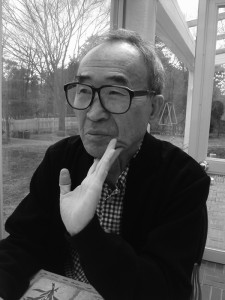A good article on Ko Un in the Herald (hat-tip to 동국의 교수님 이), which touches on quite a few interesting points.
For those who still don’t know, Ko is Korea’s most famous living poet (and the inspiration for the current bienalle in Gwangju, which is named “10,000 Lives” after Ko’s “Maninbo,” which was just finished this April after 24 years of work) “and is frequently named in cocktail chatter surrounding the Nobel Prize for Literature (about which, more soon).
Ko is a Buddhist Monk who is unconcerned with his past work, saying, ““Why do people repeatedly ask of my past when they are here to see my present? My past, my birth name, and things alike do not have meaning any longer.” At the same time, however, Ko notes that, “The past is directly related to war. I was living an unhappy life. I was born in the middle of the Japanese colonial period. Afterwards, our homeland was divided, with no future, and no dream. I have seen so many deaths through my life ― death is always clinging on my back even until now.” There is a bit of tension in those two statement, but as a Buddhist monk and Korean Ko is entitled to the latitude that Whitman claimed, “Do I contradict myself? Very well, then I contradict myself, I am large, I contain multitudes.”
Ko denies a claim of “ouvre” at the heart of his work takes a charming shot at literary critics, saying, ““I have not tied clear knots among my works over the timeline, the different pieces do not directly reflect the history, those words came out from the people who love analyzing my works.”
Also interesting, and seeming to be at least a little bit of whistling past the graveyard, Ko dismisses interest in the “Western Yardstick,” by which it is clear he means the Nobel Prize for Literature. The article says:
“People these days torture me with a certain word. I am not fond of the whole ‘generalization’ of things,” insinuating the Nobel prize though he did not mention it directly
Which is rather interesting since technically one really can’t be tortured by a concept that one has no interest in. This is really Ko’s subtle advice to the Korean populace and powers that be to stop being so worried about specific and rather random measures such as the Nobel Prize (as exemplified in this sad response to the last prize in which the Herald says, “It was, once again, a disappointment for the South Korean people”) As a man who largely lives in the moment and declares, “I’m not a poet anymore. I ‘am’ a poem,” Ko seems much more interested in the ongoing process and creativity of writing than in pieces of metal that might be awarded for it.
Ko’s “in the moment” stance is further expressed in his idiosyncratic reaction to the news that his hometown is building him a literary museum. Ko responds, “They never told me, I wasn’t notified, but whatever they are doing, I’m not interested.”
Finally, and of some interest to me, Ko has some comments about translation. In a section entitled “Translation is Creation” the article notes Ko’s success and quotes him:
Today, Ko Un’s works are translated into about 20 languages, but there are concerns that it may be impossible to translate his work’s poetic sentiment correctly. But the writer is not bothered by such concerns.
“Though translation is done in a language that I can’t read, I can sense whether the sentiment was well delivered or not,” he said, noting that the different sentiment foreign readers will experience will not be “distorted ideas” but rather a “new experience.”
That is a refreshing attitude and one I hope is picked up by the KLTI and Daesan Foundation.
Finally, in a lovely coda, Ko says, ““Now, Koreans are becoming people of joy, not the people of rancor.”
For Korean literature, and for Korea, we can only hope Ko is as descriptive a seer as he is poet.
Here is an exerpt from “Maninbo:”
Headmaster Abe
Headmaster Abe Tsutomu, from Japan:
a fearsome man, with his round glasses,
fiery-hot like hottest red peppers.
When he came walking clip-clop down the hallway
with the clacking sound of his slippers
cut out of a pair of old boots,
he cast a deathly hush over every class.
In my second year during ethics class
he asked us what we hoped to become in the future.
Kids replied:
I want to be a general in the Imperial Army!
I want to become an admiral!
I want to become another Yamamoto Isoroko!
I want to become a nursing orderly!
I want to become a mechanic in a plane factory
and make planes
to defeat the American and British devils!
Then Headmaster Abe asked me to reply.
I leaped to my feet:
I want to become the Emperor!
Those words were no sooner spoken
than a thunderbolt fell from the blue above:
You have formally blasphemed the venerable name
of his Imperial Majesty. You are expelled this instant!
On hearing that, I collapsed into my seat.
But the form-master pleaded,
my father put on clean clothes and came and pleaded,
and by the skin of my teeth, instead of expulsion,
I was punished by being sent to spend a few months
sorting through a stack of rotten barley
that stood in the school grounds,
separating out the still useable grains.
I was imprisoned every day in a stench of decay
and there, under scorching sun and in beating rain,
I realized I was all alone in the world.



